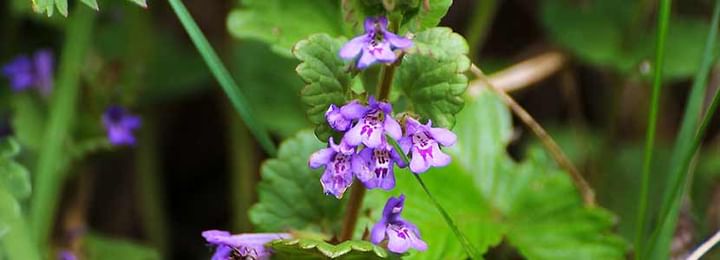Skullcap Health Benefits, Uses And Its Side Effects
Last Updated: Sep 11, 2020
Skullcap herb has been used extensively for years as an alternative medicine to help heal inflammation, provide relief from spasms, stimulate blood flow in the pelvic region, encourage menstruation, help eliminate headaches, reduce fever, treat gout and work a sedative for relaxation. Additionally, skullcap herb is also used to treat conditions such as epilepsy, insomnia, hysteria and anxiety.
Skullcap
Botanical Name of skullcap is Scutellaria lateriflora. It comes in two varieties: merican skullcap (Scutellaria lateriflora) and Chinese skullcap (Scutellaria baicalensis). Skullcap is the name of a flowering perennial plant from the mint family, Lamiaceae.Also called mad dog or blue skullcap,these are hardy, moderate sized plant with blue or purple flowers from the leaf bases on the main stem.
Nutritional Value of Skullcap
Health Benefits of Skullcap
Mentioned below are the best health benefits of consuming Chinese skullcap herb. You can use skullcap root powder, skullcap root extract, or consume skullcap root tea to manage diabetes, reduce inflammation, detoxification, and weight loss management. We also discuss some adverse effects of using a Chinese skullcap root herb in various health conditions.
Chinese Skullcap Anti-Cancer Properties
The antioxidant flavone components of the herb prevent the spread of cancerous cells. It also slows down tumor growth, induces apoptosis (sudden cell death), in cancerous cells and is used for natural treatment of cancer. Skullcap extract is toxic to cancer cells, such as brain tumor cells, prostate cancer cells, and head and neck squamous cell carcinoma cell lines.
Skullcap Calms Anxiety as a Nerve Tonic
Oxidative stress affects some brain-related diseases, such as anxiety, Alzheimer’s disease, depression and Parkinson’s disease. Skullcap may neutralize and even get rid off toxic free radicals from the body. When they are eliminated, oxidative stress is greatly reduced. Thus skullcap herb may provide significant antioxidant effects, which could make it a great option for reducing anxiety.
Benefits of Skullcap for Inflammation
Skullcap or scutellaria has some pretty effective anti-inflammatory properties. Many people who suffer with arthritis and inflammatory bowel diseases use skullcap as a home remedy.
Studies have shown additional benefits by the use of skullcap to those who have Alzheimer’s disease and Parkinson’s disease due to its anti-inflammatory effects.
Skullcap Root Manages Diabetes Problem
Insulin and glucose regulation is essential is controlled by the use of skullcap herb.It appears that skullcap is able to increase the production of insulin by the pancreas and helps to regulate the insulin levels in the body. Additionally, it has been linked to lower cholesterol levels, which is an exacerbating factor in diabetes.
Reduces Risk of Heart Disease By Consuming Chinese Skullcap Herb
Skullcap herb is able to reduce the level of cholesterol in the heart and thus lower the chances of atherosclerosis, heart attacks, coronary heart diseases, and strokes that often accompany the build-up of plaque in the arteries.
Skullcap Herbs Lowers Fever Caused from Flu
Skullcap herb is also effective in reducing fever. Tests performed on subjects revealed its effects on loewering the bodu temperature.
Treatment of Epilepsy and Reduction of Muscle Spasms By Using Skullcap
Chinese Skullcap soothes muscle spasms, muscle twitching and may aid in ailments that involve involuntary limb movement, such as Parkinson’s disease and epilepsy.
Skullcap Acts as Strong Detoxifying Herbs to Cleanse Your Body
Skullcap tea helps to detoxify our body and boost our overall health. It has been associated with an increased antioxidant activity in the liver, which is one of the slowest-recovering organs, and this effect can significantly boost the efficiency of the liver. Chinese Skullcap herb extracts reduces toxin levels in the body and blood, thereby improving overall health and wellness.
Benefits of Skullcap Herb for Weight Loss
The reduction of triglycerides stimulated by the skullcap herb can help with rapid weight loss effectively.
Uses of Skullcap
Skullcap has been found remedial in treating symptoms of withdrawal from barbiturates and tranquilizers.Medicinal infusions of this herb have been used to promote and manage menstruation.
An infusion of skullcap herb may also be helpful in treating throat infections and, due to its antispasmodic and sedative effects it is also used for treating headaches from stress, neuralgia, and from incessant coughing. Skullcap has gained some recognition as an alternative treatment for attention deficit disorder (ADHD/ADD).
This plant is sometimes considered to treat the symptoms associated with anorexia nervosa, fibromyalgia and even mild Tourette’s syndrome. Chinese skullcap is also used effectively as a herbal cure for asthma and as a hiccup and hangover remedy.
Side-Effects & Allergies of Skullcap
Excessive use of skullcap may cause stupor, confusion, irregular heartbeat, twitching, giddiness, nausea, and lightheadedness, as well as seizures in extreme cases. Pregnant women shouldn’t use this herb since it may cause a miscarriage.
Cultivation of Skullcap
Skullcap herb is native to the American wetlands and presently grows in Europe, Asia, Canada and the United States.This herb is often found in partially shaded, wetland areas. It prefers light shade to full sun and wet to moist soil with abundance of organic matter for its optimum cultivation.
References
- Shang X, He X, He X, Li M, Zhang R, Fan P, Zhang Q, Jia Z. The genus Scutellaria an ethnopharmacological and phytochemical review. Journal of Ethnopharmacology. 2010 Mar 24;128(2):279-313. [Cited 26 June 2019]. Available from:
- Wang TS, Wang SQ, Xiao DL. A review of phytochemistry and antitumor activity of a valuable medicinal species: Scutellaria barbata. Journal of Medicinal Plants Research. 2012 Jul 31;6(26):4259-75. [Cited 26 June 2019]. Available from:
- Ye F, Xui L, Yi J, Zhang W, Zhang DY. Anticancer activity of Scutellaria baicalensis and its potential mechanism. The Journal of Alternative & Complementary Medicine. 2002 Oct 1;8(5):567-72. [Cited 26 June 2019]. Available from:
Table of content
Ask a free question
Get FREE multiple opinions from Doctors



